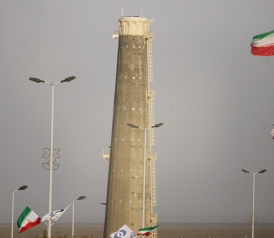The Threat of a Nuclear Theocracy: Act I

Photo by Majid Saeedi/Getty Images
This is a post in three acts – hopefully not a tragedy. The first act is an assignment that requires your willingness to set aside your preconceptions, along with 10-20 minutes, to take a deep dive on the most important issue of war and peace likely to face the United States in the next few years: Whether to launch (or encourage) a military strike against Iran’s nuclear infrastructure. In Act II, which I’ll post next week, I’ll make my own view clear, and in Act III, provide some provocative evidence that helps explain my view. Throughout I encourage audience participation, particularly among the Americans in the audience; after all, if war it is, it will be a war undertaken in your name.
Many who read this blog will already be passionately convinced of their position on Iran’s nuclear program, and the release of this week’s report by the International Atomic Energy Commission (IAEA), which amounts to confirmation that Iran is seeking the ability to “weaponize” its nuclear program, no doubt bolsters those who see an urgent need to act.
But let’s take a moment to think, first. Unfortunately, the report pulls the Iran nuclear issue off the backburner at a moment when the U.S. public, its government and political debate is focused like a (malfunctioning) laser beam on the miserable economy. Demanding that the average Joe and Jill bone up on the arcane details of nonproliferation, surgical air strikes and sanctions diplomacy is a reach in the best of times. Don’t they, after all, pay good money – in the form of taxes – to have these kinds of things decided for them by diplomatic, military and intelligence officials?
Well, yes, but given how well ceding such decisions to the executive branch has worked over the past decade, I’m going to hope – perhaps vainly -- that the run up to the next disastrous American military intervention in the Middle East will include a more skeptical assessment of the “clear and present dangers” of actually thinking about the broader implications of all these options.
And so, Act I: The Assignment: Crisis Guide Iran (embedded below) is the latest installment of an online documentary series I conceived and helped produce for the Council on Foreign Relations. Unlike most documentaries, this is not an attempt to an activist production – it will not argue for or against either the military, diplomatic or other options. Instead, like all of theses Crisis Guides, this one attempts to present the “state of the debate,” and to do so in such a way that you, the “audience,” can dive as deeply (or skim as shallowly) as you like on the issue.
Dive deep. Then let's talk.


